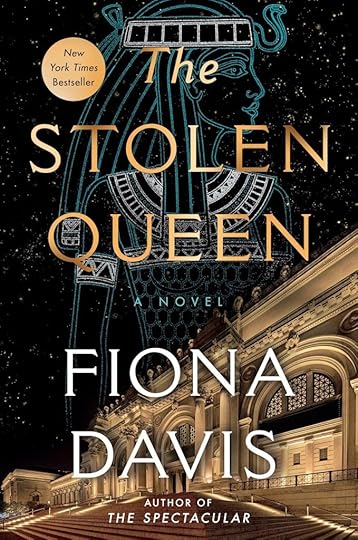Sunday Review: The Stolen Queen by Fiona Davis

I love Fiona Davis’s novels. She’ll chose a famous New York building—the Dakota, Grand Central Terminal, Radio City Music Hall—and create a dramatic story about someone whose life causes her to spend time there in some capacity. Also, ever since I was a child, I have loved to read about ancient Egypt. Something about that long-ago culture never fails to fascinate. That’s why I was so eager to read Davis’s latest effort, a novel that takes place mostly at the Metropolitan Museum of Art but also, in part, in Egypt.
In 1978, 60-year-old Charlotte Cross is an associate curator at the Met in the weeks leading up to what would be the wildly popular exhibit of artifacts from King Tut’s tomb. As a young woman 42 years before, Charlotte had participated in an archaeological dig in Egypt’s Valley of the Kings. There, she made an unexpected and significant find, fell in love, and then suffered an unimaginable tragedy. She hasn’t been back to Egypt since, although she has been secretly doing research that she suspects will overthrow the popular view of Hathorkare, a queen who became pharaoh in her own right. (For fellow ancient Egypt buffs, Hathorkare is loosely based on Hatshepsut.)
The novel’s other protagonist is nineteen-year-old Annie Jenkins, a determined young woman struggling to provide for herself and an unstable mother. While running an errand to the Met for a neighbor, she makes an unsolicited but inspired suggestion that catches the attention of fashion mogul Diana Vreeland. The encounter results in Annie being hired to be Vreeland’s assistant in organizing the Met Gala that year.
The night of the Gala, an act of sabotage threatens an exhibit of irreplaceable costumes, and while everyone is distracted trying to stave off damage, a thief steals one of the museum’s priceless objects: a fragment of a lapis lazuli bust of an Egyptian queen. Charlotte and Annie chase the thief, endangering their lives, but after a struggle, he gets away with the artifact. Blamed unfairly for the sabotage, Annie loses her job.
To try to recover the stolen object, Charlotte travels to Egypt. She is accompanied by Annie, who books a ticket despite Charlotte’s dismissal of her offer of help. While there, the pair uncover more mysteries than they ever expected.
The flashback sections remind me a bit of Agatha Christie’s novels with archaeological settings. First, Davis provides vivid details of life on a dig. Second, when bad things happen, the characters are all too willing to attribute them to a pharaoh’s curse.
The characters of both Charlotte and Annie are strong. Both are plucky women, each trying to establish themselves but burdened by past baggage. Both are products of their respective time periods, each fighting in her own way to go beyond the limits of what woman are expected to be. The secondary character of Diana Vreeland, a historical person, adds spice to the more modern sections of the story.
The end ties up everything perhaps a little too neatly for my taste, but I know that many readers prefer unambiguously happy endings, so I won’t lower my 5-star rating because of that. In short, check out The Stolen Queen—and if you haven’t read Davis’s other novels, give them a try too.



